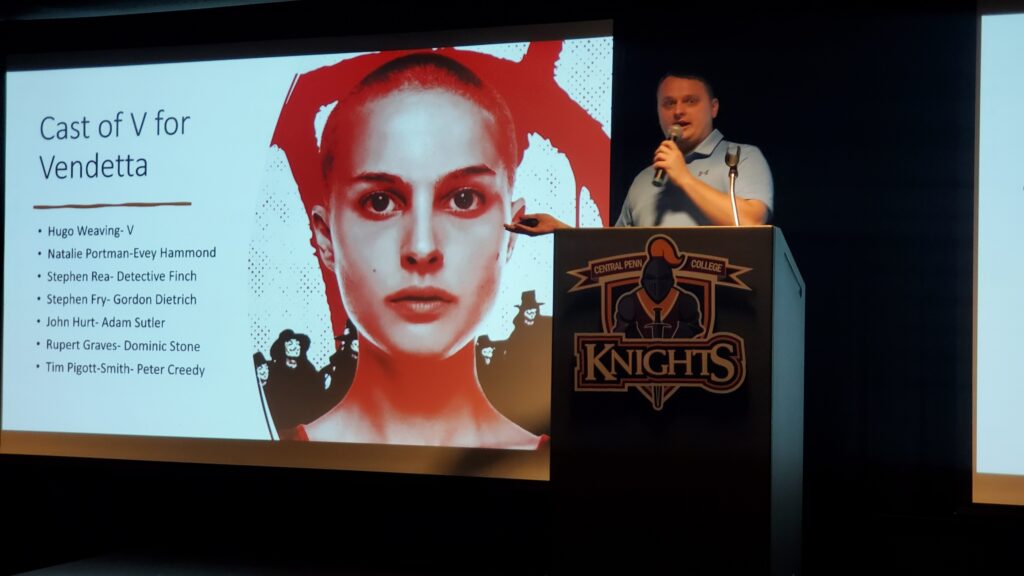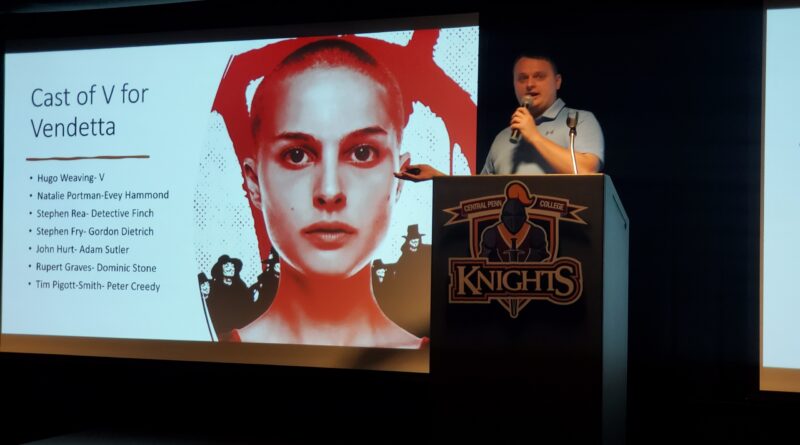The CPC Film Series returns with a vengeance with ‘V for Vendetta’

By Nik Hogan
Knightly News Film Series Correspondent
nikolai.hogan@mymail.centralpenn.edu
Former Knightly News President Brian Christiana presented the 2006 film “V for Vendetta” on May 19 as part of the quarterly CPC Film Series, in the Capital BlueCross Theatre, to a crowd of 35 people.
Christiana, a 2021 inductee to the Knightly News Hall of Fame, graduated from Central Penn College in 2020 but has continued contributing to the college and its special events. He noted in an interview that his motivation for his continued involvement with Central Penn was to keep giving back so future alums find a promising career that fits them.
Christiana works as an on-field entertainer for the Scranton Wilkes-Barre Railriders and the Lancaster Barnstormers. He is also employed part-time with iHeart Radio and works in asset protection with Weis Markets. To say he is busy with work is an understatement, making his consistent contributions to Central Penn all the more impressive. He also worked for Central Penn for about a year after graduation and is a member of the college’s alumni council.

What does this film mean to you?
“V for Vendetta” is a 2006 film directed by James McTeigue, and written by Lana and Lilly Wachowski, who also wrote and directed “The Matrix” trilogy in the late 1990s and early 2000s.
When asked why he chose to showcase “V for Vendetta” for the film series, Christiana said the movie has stayed in his mind since an assignment in high school. He said the film struck him as special by how it quickly caught his attention because of its subject matter and tone, adding that he has watched the film “at least 10 times” and took something new away from each viewing.
During his presentation, Christiana remarked how the film was very different when it was released, being a DC Comics adaptation featuring an anti-hero character as the protagonist. This reflected a trend of characters like Deadpool and Christopher Nolan’s Batman that exhibit anti-hero characteristics, which was a bold step in the comic book film catalog of the mid-2000s.
With elements of neo-noir genre conventions, including the dark tone, anti-hero protagonists and the film taking place in an urban setting, “V for Vendetta” may be partially responsible for the evolution of the superhero subgenre that dominates the box office now. Christiana was quick to note that Nolan’s “Dark Knight” trilogy is often credited as a turning point in superhero films, but pointed out that “Vendetta” also had an important role in this shift.
To extend this point, Winston Cook-Wilson of Inverse.com opined that “Batman Begins” and “V for Vendetta” left a lasting impression on film, saying, “Their Philo-101 overtones, bleak view of humanity and societal constructs, and focus on the villain’s origin story as a key to understanding their idealistic madness anticipated the tone of many of the action and superhero films that have come in its wake.”
Presenting the magic
Christiana spoke in his preview presentation about what the movie did for the industry and why he holds it in such high regard. He brought up several fun facts about the making of the film and the relevance it holds to this day.
“V for Vendetta” is one of the few DC Comics movies with an R rating and stood as Warner Brothers’ fourth highest-grossing film ($70 million domestically and $135 million worldwide) of 2006, a year of heavy-hitting films like “Superman Returns.” The movie stands at an 8.2 rating on IMDb, good enough to come in at #158 of the best films of all time, according to the website. The film also took home seven awards in 2006, as well as being nominated for 29 awards through a variety of different outlets.
This movie marked McTeigue’s directorial debut, though it is crucial to note that he was the first assistant director of “The Matrix” trilogy, and for “Star Wars: Episode II — Attack of the Clones.” Other films he has directed are “The Raven” and “Ninja Assassin.”
Natalie Portman played the main character, Evey Hammond, and went on to star in “The Black Swan,” “Thor” and “Jackie.” Hugo Weaving, who plays the titular anti-hero V, would go on to act in “Transformers,” “Captain America” and “The Hobbit.”
“V for Vendetta” has retroactive relevance in today’s society. The movie looks at several components that wouldn’t become issues until many years after its release. The film, for instance, showcases gun violence with police, a pandemic that sweeps the entire world, protests that would erupt around the country and a corrupt government that has direct control over the media.
From a post-2020 perspective, several parallels emerge in the film, specifically related to the COVID-19 pandemic and subsequent fallout, as well as the Black Lives Matter protests of the summer of 2020. While prior to 2020, watching this film would have had value, a rewatch after the pandemic serves to illustrate a form of prediction of what could have been and potentially might still be in our society.

The audience engaged
During the film’s screening, the audience was engaged the entire time. Some would discuss what was happening onscreen, and others would stay silent. The movie requires paying close attention to some of its themes, as some subjects are more subtle than others.
“V for Vendetta” is seen as a cult-classic film, and the most exciting part about the film is that everybody in the theater took something different from it.
Upon the film’s conclusion, there were various discussions among audience members, each interpreting the film differently.
One audience member found the film “creepy” and felt it included themes of Stockholm syndrome, in which hostages develop positive feelings about their captors.
Another thought the movie should have had more explanation of the story of Guy Fawkes, on which the movie’s narrative, and the plans and actions of V, draws. Fawkes was a British soldier who participated in the unsuccessful Gunpowder Plot of 1605, which was aimed at blowing up Westminster Palace while King James I and his close advisers met there as Parliament opened on Nov. 5, to protest oppression of Roman Catholics.
From the start of the film to its finish, the audience was fascinated with where the movie was going with its story, which was filled with twists that no one who hadn’t watched it previously would have seen coming.
Regardless of what people took away from the movie, it clearly left an impression on everyone who watched it that night.
At the end of his presentation, Christiana commented on why he returned to campus to be a part of the CPC Film Series, and offered future graduates some advice.
“You always have to say yes, whether it’s opportunities or chances, you have to get out there and don’t be afraid to try new things because that opportunity may never come up again,” he said.
The CPC Film Series is set to return in the summer term, with former Knightly News President Dylan Bowman presenting his original film from his Fellowship Studios, “Vintage.” The date for that showing has not been set, but follow Central Penn announcements and The Knightly News for when “Vintage” will be shown at the college.
Comment or story idea? Contact KnightlyEditors@CentralPenn.Edu.
Edited by media-club co-advisers Paul Miller and Michael Lear-Olimpi. Miller is chair of the CPC Film Series Committee and Lear-Olimpi is editor of this blog.



